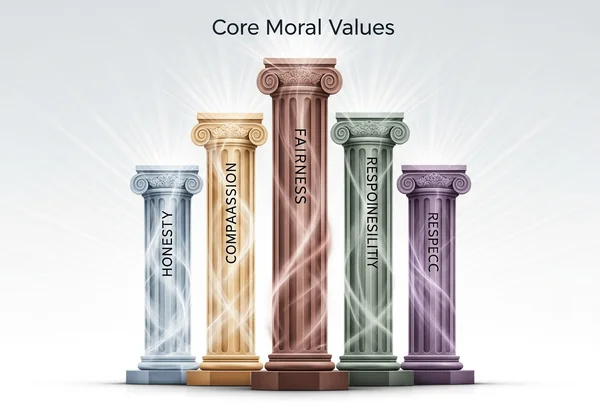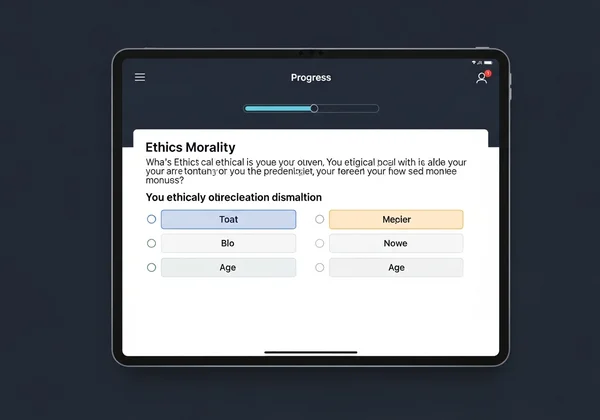Moral Test: A Deep Dive into Your 5 Core Moral Values
October 8, 2025 | By Julian Croft
Have you ever wondered what truly drives your decisions? Beneath the surface of our daily choices lies a hidden framework, an internal compass that guides our actions, shapes our relationships, and defines our character. This framework is built upon our core moral values. But what are the 5 moral values that guide your life? Understanding these foundational principles unlocks profound self-awareness and personal growth. This guide will illuminate these essential values, helping you map your own ethical landscape and discover the true north of your moral compass. For a truly personalized map, you can always explore your values with a deeper analysis.

Understanding Core Moral Values: Your Ethical Blueprint
Think of core moral values as the architectural blueprint for your identity. They are the deeply held beliefs that dictate what you consider right or wrong, important or trivial. While countless values exist, a few fundamental ones consistently emerge across cultures and philosophies as the pillars of a strong ethical character. These aren't just abstract ideas; they actively shape our empathy, integrity, and sense of justice. Let's explore five of the most crucial ones.
Honesty & Integrity: The Bedrock of Trust
At its heart, honesty is about truthfulness, but integrity is about living that truth consistently. Integrity means your actions align with your values, even when no one is watching. It's the difference between not lying to avoid getting caught and not lying because you believe in the inherent value of truth. This combination is the bedrock of all meaningful relationships, both personal and professional. Without it, trust cannot flourish, and communication breaks down. Cultivating honesty and integrity means building a reputation for reliability and creating a life where your inner self and outer actions are in perfect harmony.
Compassion & Empathy: Connecting with Others
While often used interchangeably, compassion and empathy are distinct yet related. Empathy is the ability to feel with someone—to understand their perspective and share their emotional state. Compassion is empathy in action. It's the desire to alleviate another's suffering that stems from that shared feeling. These values are the glue that binds society together. They drive us to help a stranger, listen to a friend in need, and consider the impact of our decisions on others. A well-developed sense of compassion transforms our interactions from transactional to truly human, fostering connection and kindness.
Fairness & Justice: Ensuring Equity
Fairness means being impartial and treating everyone equally. It's the conviction that rules should apply to everyone equally and that individuals should get what they deserve, free from bias or favoritism. Justice takes this a step further, often referring to the systems and structures that uphold fairness on a broader scale. This value prompts us to stand up for the underdog, challenge discrimination, and strive for a world where everyone has an equal opportunity to succeed. It requires us to look beyond our own self-interest and consider the well-being of the entire community, making it a cornerstone of a civil and ethical society.
Responsibility & Accountability: Owning Your Actions
Responsibility is about acknowledging your duties to others and to yourself, while accountability is about taking ownership of the outcomes of your actions—both good and bad. It’s easy to take credit for successes, but true moral character is revealed in how we handle our failures. Accepting accountability means resisting the urge to blame others or make excuses. It’s about learning from mistakes, making amends where necessary, and committing to doing better in the future. This value is essential for maturity and personal growth, empowering you to be the author of your own life story.
Respect & Dignity: Valuing Every Individual
Respect is the fundamental recognition of the inherent worth and dignity of every person, regardless of their background, beliefs, or status. It's about treating others as you wish to be treated, listening to their opinions even when you disagree, and honoring their autonomy. Respect is demonstrated in small gestures—like paying attention when someone speaks—and in large ones, like advocating for human rights. It forms the basis of civility and cooperation, allowing a diverse society to function peacefully and productively. By valuing the dignity in others, we affirm the dignity within ourselves.

How to Identify Your Values: Beyond Definitions
Knowing the definitions of these values is one thing, but understanding how they operate within you is another. Your personal moral code is a unique blend of these principles, prioritized based on your life experiences, upbringing, and reflections. The journey to discover your ethical core is one of the most rewarding you can take.
Reflecting on Personal Experiences and Beliefs
Start by looking at your own life. Think about moments when you felt proud, angry, or deeply satisfied. What values were at play? The times you stood up for someone likely highlighted your value of fairness. The moments of deep connection pointed to compassion. Your most difficult decisions often reveal a conflict between two cherished values. Journaling about these experiences can help you uncover a consistent pattern in your moral decision-making. These reflections are the raw data for understanding your unique ethical blueprint.
Navigating Dilemmas: Values in Action
Ethical dilemmas are where your values are truly tested. When faced with a tough choice where two or more values are in conflict, which one do you prioritize? For example, does your loyalty to a friend (respect/compassion) outweigh your duty to be truthful (honesty)? There are no easy answers, but how you navigate these challenges reveals your moral hierarchy. Thinking through hypothetical scenarios can be a powerful exercise. It prepares you to act with intention when real-life dilemmas arise. Taking an ethical compass test can provide you with structured scenarios to explore these very conflicts safely.
The Role of a Free Online Moral Test
While self-reflection is powerful, objective feedback can provide clarity and uncover blind spots. This is where a well-designed tool can be transformative. A free online moral test doesn't just tell you what you already know; it challenges you with nuanced scenarios developed by experts in ethics and psychology. By analyzing your responses, our platform can give you a detailed breakdown of your ethical leanings. It provides a structured, scientific-based framework to see your values in action. This is more than a quiz; it’s a journey into your own decision-making process. Are you ready to start your free test?

Unlocking Your Moral Compass: Your Next Steps
Understanding the five core moral values—honesty, compassion, fairness, responsibility, and respect—is the key to a more conscious and intentional life. These principles are not just abstract ideals; they are practical tools that help you build trust, connect with others, and navigate the complexities of the modern world with integrity. They form the very essence of your ethical compass.
But reading about them is just the beginning. The real journey of discovery begins when you turn inward and map your own moral terrain. By reflecting on your experiences and challenging your assumptions, you can gain a clearer understanding of who you are and who you want to be.
If you are ready to take the next step and gain deep, personalized insights into your unique ethical profile, we invite you to take the Moral Test today. Our free, AI-powered assessment is designed to provide you with a comprehensive report on your moral foundations, helping you unlock a deeper level of self-awareness.

Frequently Asked Questions About Moral Values & Tests
What is a basic moral test, and how does it help?
A basic moral test is a tool designed to help you understand your ethical leanings and decision-making patterns. It typically presents you with a series of hypothetical scenarios or questions that challenge your values. It helps by providing objective insights into your moral compass, revealing your priorities, and highlighting potential areas for personal growth. A good moral assessment test can make abstract concepts like fairness and compassion tangible.
How do I figure out my morals and values?
Figuring out your morals and values is an ongoing process of self-reflection. Start by examining key life experiences and the decisions you're most proud of. Ask yourself what principles guided you. You can also identify role models and analyze the values they embody. For a more structured approach, tools like the free morality test on our platform provide a systematic way to analyze your responses to complex ethical dilemmas and receive a detailed report.
Are the "5 core moral values" universal for everyone?
While the specific expression of values can vary across cultures, the core concepts of honesty, compassion, fairness, responsibility, and respect are remarkably widespread. Most ethical systems and societies recognize these principles as essential for cooperation and human flourishing. However, individuals and cultures may prioritize them differently, which is what creates such a rich diversity of moral perspectives.
What are the four basic moral principles?
In the field of bioethics, four principles are often cited as foundational: autonomy (respecting a person's right to make their own decisions), beneficence (acting in the best interest of others), non-maleficence (the duty to "do no harm"), and justice (fair distribution of resources and treatment). These principles overlap significantly with the five core values discussed and provide another useful framework for ethical analysis.